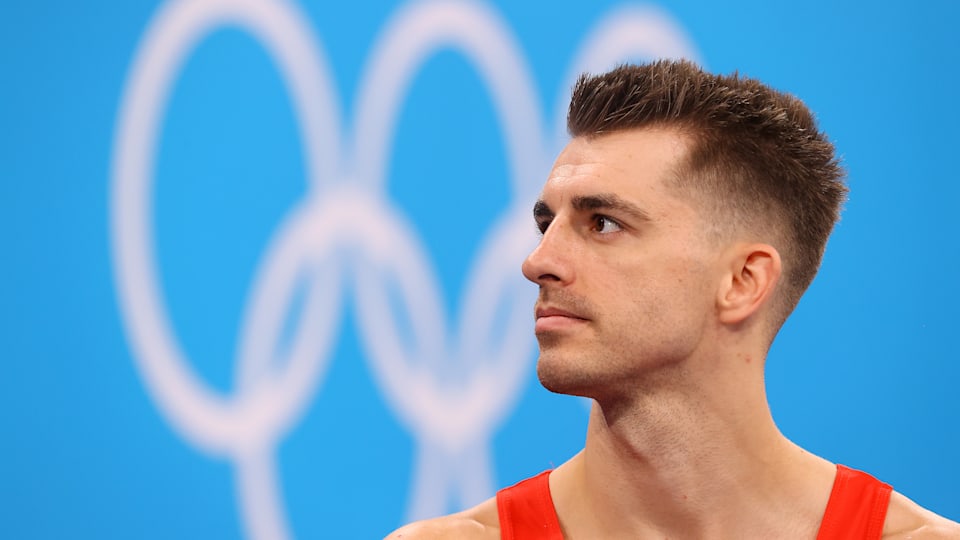Max Whitlock's phased return to gymnastics is paying off as he eyes Olympic history at Paris 2024
When a gymnast returns to training after a lengthy time out, what are those first steps like? And what is the history-making moment the 30-year-old could claim in France? Olympics.com spoke to Max Whitlock to find out.

"I remember the first day back in (the gym), I pretty much did no training," British gymnast Max Whitlock told Olympics.com in an exclusive interview in February. It had been 18 months since he had last competed, defending his pommel horse title at Tokyo 2020, and the 30-year-old was officially announcing a return to gymnastics in a bid to qualify for a fourth Olympic Games, at Paris 2024.
"I would just be coming in and just chatting to people. And it was like that for a few sessions and then week by week I just very, very slowly built it up."
That gentle phase was necessary. The three-time Olympic champion, who is cometing in his seventh World Championships, in Antwerp, Belgium from 30 September to 8 October, hadn't quite made up his mind to officially return to the artistic gymnastics fray. He was just feeling things out.
Post Tokyo 2020, delayed to 2021, the Essex-based gymnast struggled for the first time with his mental health following an Olympic Games.
"A lot of athletes talk about the low after the Olympic Games and I never could even comprehend it or even relate to it at all, but now I really can. I can really relate to that feeling of being completely lost, just struggling constantly."
Whitlock couldn't even work out himself what was wrong, let alone explain it to others including wife Leah, his parents and coach Scott Hann. Any mentions of a return to the gym were met with resistance, until one day, Hann received a call.
"He knew he wanted some time off and I thought it was the best thing for him to have that time off and completely have it off away from the sport," Hann told Olympics.com. "So I gave him that time but as he started to struggle through that period that's when the communication started, and we spoke to each other a few times.
"And then I got a phone call, and the phone call was, 'Can I have a chat with you?' And I sort of knew what it was going to be. And that was the point where he wanted to come back and give it another shot."
But how does that process even begin to happen after such a lengthy time out?
Max Whitlock back in the gymnastics fold
"It was just casual coming back," said Whitlock, who trains alongside the likes of British team-mates Courtney Tulloch and Pavel Karnejenko. "I'd obviously seen the boys... during that period of having the year off, so it wasn't like I was the stranger coming back, which was nice.
"I think it was important for me for that coming back I just take it slow. I was almost in a fragile mindset... so just take it literally step by step, bit by bit."
That gentle return phase was lengthy, and necessary for the Brit whose thoughts could have run away with him if he'd let them.
Should the three-time Olympic medallist on pommel horse win a fourth medal on the apparatus in Paris, Whitlock would be the only gymnast in history - man or woman - to have claimed four Olympic medals on one piece of apparatus.
There's a way to go before that point, not least qualifying for the increasingly strong British men's side.
The quintet of Joe Fraser, Giarnni-Regini-Moran, Jake Jarman, James Hall and Tulloch finished in bronze medal position in the team event at the 2022 World Championships, only the second time the men had won an artistic team medal in the competition.
Not only that, courtesy of the top-three finish in which they finished behind People's Republic of China in first and Japan, second, secured a quota spot for Team GB men for the Olympic Games Paris 2024.
The five-man team will be selected by the National Olympic Committee closer to Games-time, and Whitlock hopes to be one of those jostling for a spot.
But those thoughts were far from his mind as he tiptoed his way back into the sport he started when he was seven years old and in which he won his first Olympic medals – bronze in the team event and on the pommel horse – aged 19, at London 2012.
- Click here to see the official qualification system for each sport.
- As National Olympic Committees have the exclusive authority for the representation of their respective countries at the Olympic Games, athletes' participation at the Paris Games depends on their NOC selecting them to represent their delegation at Paris 2024.
Max Whitlock's arena return
Whitlock would go to the South Essex Gymnastics Club, run by Hann, a couple of times a week for a lengthy period, doing very small amounts of gymnastics. An hour would extend to 90 minutes, then two hours, vital incremental steps for Whitlock.
"That was really important for me to just take that back, so that I kept that excitement, being back in, almost look forward to really coming into the next session."
Not only was the mental aspect important to navigate gently but the physical side, too.
"A year out of sport is hard, especially on the body, so I made sure [I was] just tapering and being really safe because that period that was crucial for not only my mindset but physically.
"If I got injured in that period, that would have been a huge setback and I'd have had to start again, which would have been more time out.
"So, taking it slow was key and I just really enjoyed that period because that was where I decided to make a decision, 'Yeah, I'm coming back in', and just rein it in and just take it slow and enjoy it.
"It's good to be back training with the boys, training with the team."
Antwerp World Championships next step
The first competitions back were low-key early season events.
The Scottish Gymnastics Championships in February saw Whitlock appear as a guest competitor, solely competing in pommel horse qualifications, going clean scoring the top mark on the day of 14.850, with a huge 6.7 difficulty score. Next best was his club team-mate, Karnejenko on 13.250.
At the following week's English Championships, Whitlock again top scored on pommel horse with 15.350. He also competed on parallel bars, where he finished second (13.950) to Luke Whitehouse's 14.050. A mistake on high bar left him with a two-out-of-three hit rate – not bad in a second competition back since Tokyo 2020, which had taken place 18 months previously.
Next up was the British Championships in March, an event that reminded Whitlock the journey ahead was never going to be easy, coming off the pommel horse twice before finishing with a wry smile. Despite making the parallel bars and high bar final he opted to leave it there.
A first showing back on the international stage came in early September in France, which saw him pitted against the reigning pommel horse world champion, Rhys McClenaghan, who competes for Ireland.
It was Whitlock who came out on top, with a stonking performance scoring 15.450, to McClenaghan's 15.100, but it was the big smile that revealed the most.
"Competition done, really happy with that, and was amazing to be back out there," Whitlock posted on Instagram. "Amazing competition to be a part of and a great stepping-stone as we get closer to the World Championships."
And the place where he made his return to the global stage? The Bercy Arena, which just so happens to be the venue for the artistic gymnastics at Paris 2024, which starts in less than a year's time.
Game on.

